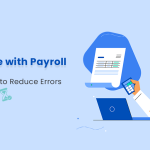While large organizations can easily afford to run dedicated payroll departments, this is often not a viable expense for small and medium-sized companies. In fact, preparing and running payroll cycles requires significantly more time and attention to detail than many people initially realize. Moreover, substantial time is needed to calculate employee hours, manage deductions, track paid time off, and account for sick leave. After these calculations, there is also the additional task of printing, signing, and distributing paychecks, followed by the generation of payroll reports. Furthermore, the ongoing need to stay up to date with the latest laws and regulations adds another layer of complexity. Consequently, the time required to effectively and efficiently manage payroll becomes a significant burden.
Additionally, if you multiply the hours spent on payroll tasks by the salary cost of your internal resources and compare this with the cost of outsourcing, the potential savings become quite apparent. Therefore, outsourcing payroll not only alleviates the administrative burden but also results in cost savings that can be better utilized in other strategic areas of the business. Moreover, the streamlined processes and expert handling by an external provider ensure compliance and accuracy, further enhancing operational efficiency.













